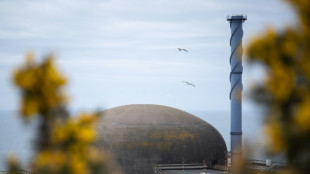
-
 Stock steady, dollar climbs before Fed rate decision
Stock steady, dollar climbs before Fed rate decision
-
Spanish PM's wife denies wrongdoing in graft probe hearing

-
 'Ordinary and out of the ordinary': covering France's mass rape trial
'Ordinary and out of the ordinary': covering France's mass rape trial
-
Activist tells Saudi-hosted UN forum of 'silencing' of dissent

-
 UK electricity grid set for 'unprecedented' £35 bn investment
UK electricity grid set for 'unprecedented' £35 bn investment
-
Putin-tattooed dancer Polunin says leaving Russia

-
 USA star Weah picks up thigh injury: Juventus
USA star Weah picks up thigh injury: Juventus
-
France's Sarkozy must wear electronic tag after losing graft case appeal

-
 Olympic champion Hodgkinson's coaches eye 800m world record
Olympic champion Hodgkinson's coaches eye 800m world record
-
Germany criticises UniCredit's 'unfriendly' moves on Commerzbank

-
 Serbia's capital Belgrade to make public transport free
Serbia's capital Belgrade to make public transport free
-
Three 'transformations' for nature, according to UN experts

-
 Russian oil spill contaminates 50km of Black Sea beaches
Russian oil spill contaminates 50km of Black Sea beaches
-
Climate change made Cyclone Chido stronger: scientists

-
 After long delay, French nuclear plant coming on stream
After long delay, French nuclear plant coming on stream
-
Syrians face horror, fearing loved ones may be in mass graves

-
 UN calls for 'free and fair' elections in Syria
UN calls for 'free and fair' elections in Syria
-
Dutch authorities fine Netflix 4.75 mn euros over personal data use

-
 Further hike in UK inflation hits rate cut chance
Further hike in UK inflation hits rate cut chance
-
UK's Farage says in 'negotiations' with Musk over funding

-
 Fiji rules out alcohol poisoning in tourists' mystery illness
Fiji rules out alcohol poisoning in tourists' mystery illness
-
Pokemon is back with a hit new gaming app

-
 Flintoff to coach son on England second-string tour of Australia
Flintoff to coach son on England second-string tour of Australia
-
Stock markets, dollar climb before Fed rate decision

-
 Spain PM's wife testifies in corruption case
Spain PM's wife testifies in corruption case
-
Belgian cycling legend Rik Van Looy dies aged 90

-
 Syria's first flight since Assad's fall takes off
Syria's first flight since Assad's fall takes off
-
Devastated Mayotte battles to recover from cyclone 'steamroller'

-
 France assesses scale of Mayotte 'disaster' as aid arrives
France assesses scale of Mayotte 'disaster' as aid arrives
-
US, Chinese ships at Cambodia bases as Washington navigates diplomatic currents

-
 Amorim eager for wantaway Rashford to stay at Manchester United
Amorim eager for wantaway Rashford to stay at Manchester United
-
Warmer winter melts incomes of China's ice cutters

-
 Halep, Cruz Hewitt handed wildcards for Australian Open qualifying
Halep, Cruz Hewitt handed wildcards for Australian Open qualifying
-
Xi hails Macau 'success' in visit for 25th anniversary of Chinese rule

-
 New Japan coach Nielsen targets Women's World Cup glory
New Japan coach Nielsen targets Women's World Cup glory
-
Ravichandran Ashwin - 'accidental spinner' who became India great

-
 Rescuers hunt for survivors in Vanuatu quake, nine dead
Rescuers hunt for survivors in Vanuatu quake, nine dead
-
Shares in Japan chipmaker Kioxia jump 10% on Tokyo debut

-
 Rohit says India's fightback means nothing for Melbourne
Rohit says India's fightback means nothing for Melbourne
-
Shares in Japan chipmaker Kioxia jumps 10% on Tokyo debut

-
 Asian markets mixed ahead of Fed news, Nissan soars on merger reports
Asian markets mixed ahead of Fed news, Nissan soars on merger reports
-
France mass rape trial triggers soul-searching in Spain

-
 Japanese startup's space rocket launch fails
Japanese startup's space rocket launch fails
-
India 'all-time great' Ashwin retires from international cricket

-
 Floor-length and horns: Namibia's Herero dress endures
Floor-length and horns: Namibia's Herero dress endures
-
Japanese carmakers Honda, Nissan in preliminary merger talks: reports

-
 India spin great Ashwin retires from international cricket
India spin great Ashwin retires from international cricket
-
Hitting hard in Ghana's boxing hotspot

-
 Mayotte reels from cyclone devastation, France's Macron to arrive Thursday
Mayotte reels from cyclone devastation, France's Macron to arrive Thursday
-
Economic woes mount for Russia's war machine


Syrians face horror, fearing loved ones may be in mass graves
After losing hope of finding his two brothers among those freed from Syrian jails, Ziad Alaywi was filled with dread, knowing there was only one place they were likely to be: a mass grave.
"We want to know where our children are, our brothers," said the 55-year-old standing by a deep trench near Najha, southeast of Damascus.
"Were they killed? Are they buried here?" he asked, pointing to the ditch, one of several believed to hold the bodies of prisoners tortured to death.
International organisations have called these acts "crimes against humanity".
The fate of tens of thousands of prisoners and missing people remains one of the most harrowing parts of the Syrian conflict, which claimed more than 500,000 lives.
Since the fall of Bashar al-Assad's regime on December 8 and the takeover by an Islamist-led rebel alliance, families across Syria have been searching for their loved ones.
"I've looked for my brothers in all the prisons," said the driver from the Damascus suburbs, whose siblings and four cousins were arrested over a decade ago.
"I've searched all the documents that might give me a clue to their location," he added, but it was all in vain.
Residents say there are at least three other similar sites, where diggers were frequently seen working in areas once off-limits under the former government.
- 'Peace of mind' -
The dirt at the pit where Alaywi stands looks loose, freshly dug. Children run and play nearby.
If the site was investigated, "it would allow many people to have peace of mind and stop hoping for the return of a son who will never return", he said.
"It's not just one, two, or three people who are being sought. It's thousands."
He called on international forensic investigators to "open these mass graves so we can finally know where our children are."
Many Syrians who spoke to AFP in recent days expressed disappointment at not finding their loved ones in the prisons opened after the takeover by Hayat Tahrir al-Sham (HTS).
A few kilometres (miles) from Najha, a team of about 10 people, most in white overalls, was transferring small white bags into larger black ones with numbers.
Syrian Civil Defence teams have received numerous calls from people claiming to have seen cars dumping bags by the roadside at night. The bags were later found to contain bones.
"Since the fall of the regime, we've received over 100 calls about mass graves. People believe every military site has one," said civil defence official Omar al-Salmo.
- Safeguard evidence -
The claim isn't without reason, said Salmo, considering "the few people who've left prisons and the exponential number of missing people."
There are no official figures on how many detainees have been released from Syrian jails in the past 10 days, but estimates fall far short of the number missing since 2011.
In 2022, the Syrian Observatory for Human Rights monitor estimated that more than 100,000 people had died in prison, mostly due to torture, since the war began.
"We're doing our best with our modest expertise," said Salmo. His team is collecting bone samples for DNA tests.
On Tuesday, Human Rights Watch urged the new Syrian authorities to "secure, collect and safeguard evidence, including from mass grave sites and government records... that will be vital in future criminal trials".
The rights group also called for cooperation with the International Committee of the Red Cross, which could "provide critical expertise" to help safeguard the records and clarify the fate of missing people.
Days after Assad's fall, HRW teams visiting Damascus's Tadamun district, the site of a massacre in April 2013, found "scores of human remains".
In Daraa province, Mohammad Khaled regained control of his farm in Izraa, seized for years by military intelligence.
"I noticed that the ground was uneven," said Khaled.
"We were surprised to discover a body, then another," he said. In just one day, he and others including a forensic doctor exhumed a total of 22 bodies.
K.Brown--BTB
